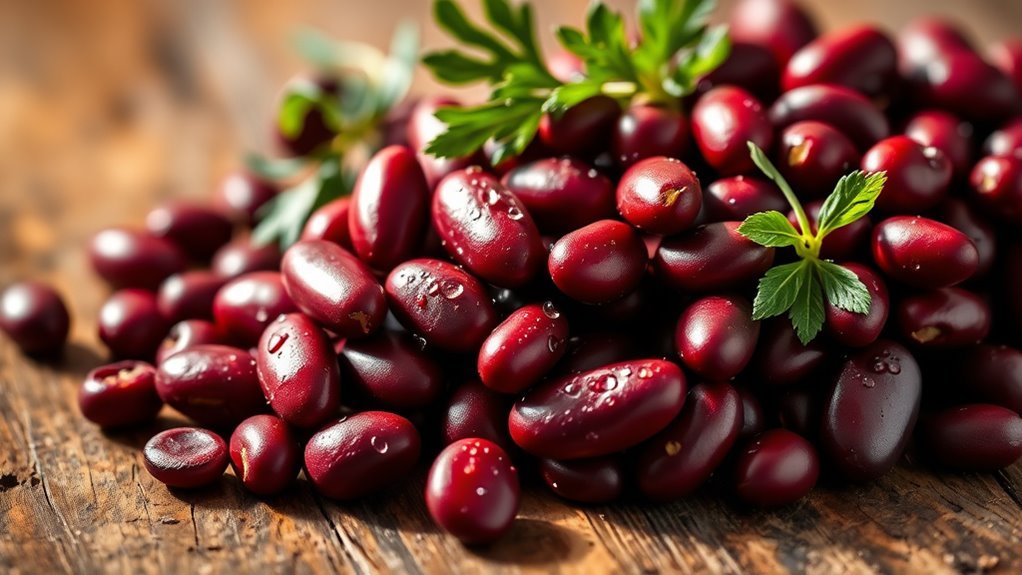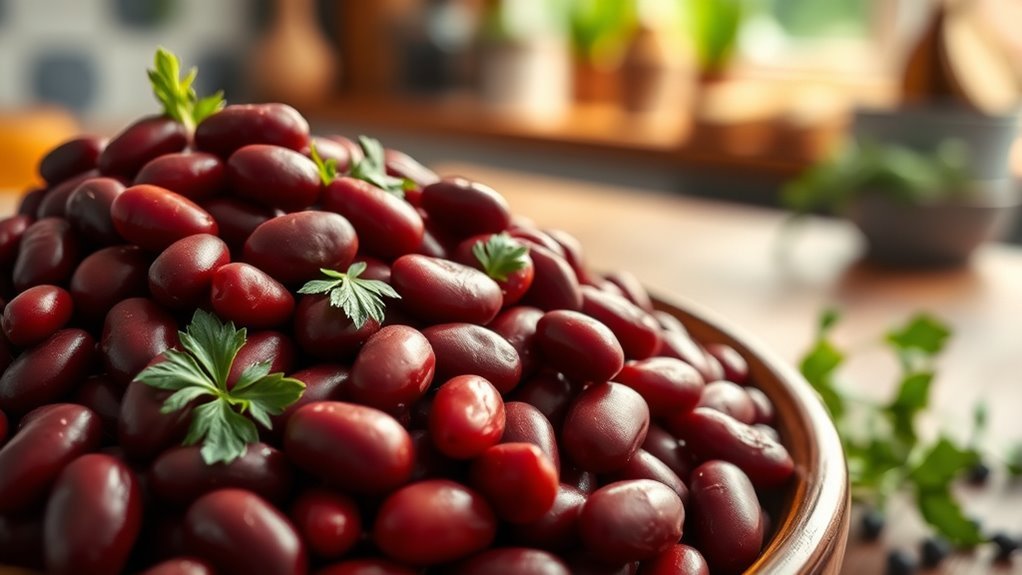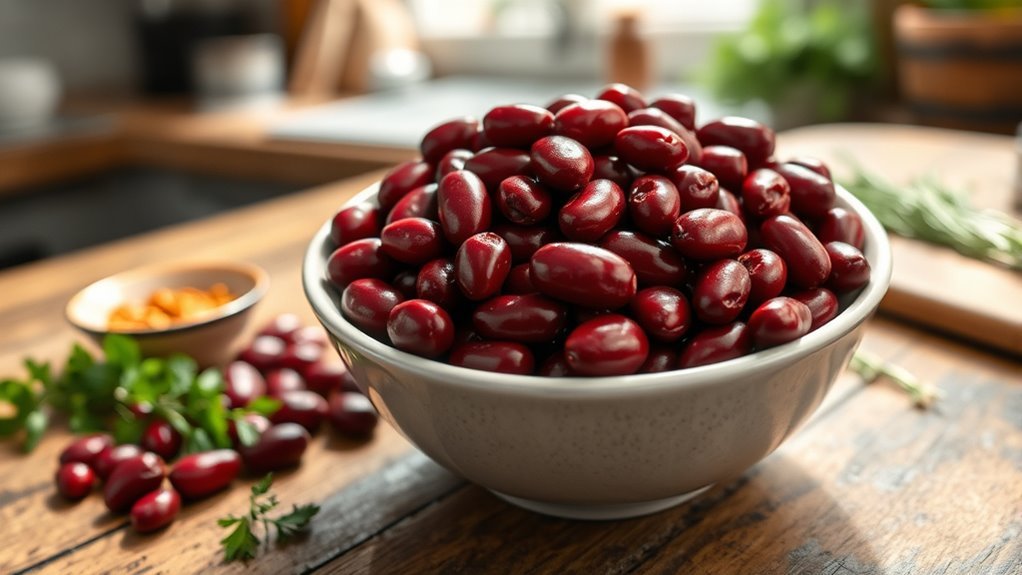Kidney beans aren’t regarded as keto-friendly due to their high carbohydrate content, which can disrupt ketosis and hinder fat burning. Each cooked cup contains about 20 grams of carbs, making it challenging to maintain the low carb intake required for ketosis. While their nutritional profile is impressive, you may want to evaluate alternatives that are lower in carbs if you’re serious about sticking to a ketogenic diet. There’s more to explore on this topic and your options.
Understanding the Ketogenic Diet

The ketogenic diet, often referred to as keto, is a low-carbohydrate, high-fat eating plan designed to shift your body’s metabolism away from carbohydrates and toward fats for energy. By understanding the ketogenic principles, you can embrace this lifestyle that promotes fat as your primary energy source. This shift not only helps in weight management but can also improve mental clarity and energy levels. You’ll typically consume about 70% of your calories from dietary fat, with a significant reduction in carbs to about 5-10%. This approach encourages the body to enter a state of ketosis, where it efficiently burns fat for fuel. If you’re seeking freedom in your food choices while prioritizing health, keto might just be the answer for you.
Nutritional Profile of Kidney Beans

Kidney beans, often celebrated for their rich nutrient profile, provide a variety of essential vitamins and minerals. Their impressive health benefits make them a popular choice among many meal ideas. Here are three key aspects of their nutritional profile:
- High Protein Content: Kidney beans are a fantastic plant-based protein source, supporting muscle health and overall wellness.
- Excellent Fiber Sources: The fiber in kidney beans aids digestion, promoting gut health and reducing the risk of constipation.
- Nutrient Density: Packed with vitamins like folate and minerals such as iron, kidney beans contribute to a balanced diet.
Different cooking methods, like boiling or slow-cooking, can enhance their digestibility, allowing you to enjoy their numerous health benefits in a variety of dishes.
Carb Count in Kidney Beans

When considering the carb count in kidney beans, it’s important to recognize their role in a balanced diet. Kidney beans contain about 20 grams of carbs per cup when cooked, which can be significant for those monitoring their carb intake. However, their high fiber content—around 6 grams—can help offset the net carbs, making them a more appealing option for many. The kidney benefits, such as their rich protein and nutrient profile, can support overall health. While they may not fit into a strict keto diet, incorporating kidney beans in moderation can provide essential nutrients. Ultimately, understanding their carb content allows you to make informed dietary choices that align with your lifestyle goals.
Comparing Kidney Beans to Other Beans
While many people enjoy beans for their nutritional benefits, it’s important to compare kidney beans to other varieties to understand their unique attributes and how they fit into your diet. Here’s a quick look at how kidney beans stack up against other common bean varieties:
- Nutritional Content: Kidney beans are rich in protein and fiber, providing essential nutrients that can support overall health, while black beans offer higher antioxidants.
- Glycemic Index: Compared to chickpeas, kidney beans have a lower glycemic index, making them a better choice for blood sugar management.
- Versatility: Kidney beans are often used in chili and salads, while pinto beans shine in refried dishes, highlighting the diversity among bean varieties.
Understanding these differences can help you choose the best options for your dietary needs.
How Kidney Beans Affect Ketosis
Although they’re a nutritious option, kidney beans may not be the best choice if you’re aiming for ketosis. These beans are relatively high in carbohydrates, which can hinder your body’s ability to enter ketosis. When you consume kidney beans, their carb content can disrupt your carb metabolism, making it challenging to maintain the low-carb intake necessary for achieving and sustaining ketosis. The ketosis effects you seek—such as increased fat burning and improved energy levels—might be compromised if you include too many carbs from sources like kidney beans. If you’re committed to a keto lifestyle, it’s essential to monitor your carb intake closely, and opting for lower-carb alternatives might serve you better in your journey.
Incorporating Kidney Beans Into a Keto Diet
If you’re keen to enjoy kidney beans while following a keto diet, it’s essential to approach their incorporation thoughtfully. Here are three ways to include them in your meal plan without derailing your goals:
- Portion Control: Use kidney beans sparingly. A small amount can add flavor and texture without overwhelming your carb intake.
- Keto Meal Prepping: Consider preparing meals that combine kidney beans with low-carb vegetables. This way, you can enjoy their benefits while maintaining keto-friendly macros.
- Bean Recipes: Explore creative recipes that feature kidney beans but balance them with higher-fat ingredients, such as avocado or olive oil, to keep your meals satisfying and compliant.
Alternatives to Kidney Beans on Keto
If you’re looking for alternatives to kidney beans on a keto diet, there are several low-carb options to contemplate. Vegetables like zucchini and cauliflower can serve as great substitutes, while high-fiber keto foods such as chia seeds and flaxseeds offer nutritional benefits without the carbs. Exploring these alternatives can help you maintain your keto lifestyle while still enjoying a variety of flavors and textures.
Low-Carb Bean Options
When you’re following a keto diet, finding low-carb alternatives to kidney beans can be essential for maintaining your carb limit while still enjoying a variety of flavors and textures. Here are three low-carb bean options that can serve as great bean alternatives:
- Black Soybeans: Packed with protein and very low in carbs, these are an excellent choice for keto enthusiasts.
- Green Beans: Technically not a bean, but they offer a similar texture and only about 4 grams of carbs per cup.
- Chickpeas (in moderation): While slightly higher in carbs, using them sparingly can still fit into a low-carb meal plan.
These low carb legumes can help diversify your meals without compromising your dietary goals. Enjoy experimenting!
Vegetable Substitutes for Beans
For those on a keto diet, kidney beans may not fit the low-carb criteria, but there are plenty of vegetable substitutes that can add similar textures and flavors to your meals. Here are some excellent vegetable options and bean alternatives to evaluate:
| Vegetable Option | Description |
|---|---|
| Zucchini | Shredded or diced, it mimics the texture of beans in dishes. |
| Cauliflower | Riced or mashed, it can substitute for beans in casseroles. |
| Mushrooms | Their umami flavor adds depth to dishes, similar to beans. |
| Eggplant | Diced or pureed, it offers a hearty texture. |
| Green beans | They provide a crunchy bite and can replace beans in salads. |
Experimenting with these options can keep your meals satisfying without compromising your keto goals.
High-Fiber Keto Foods
While kidney beans are often praised for their fiber content, those following a keto diet might find it challenging to include them due to their higher carbohydrate count. Fortunately, there are several high-fiber keto-friendly sources you can enjoy without compromising your carb limits. Here are three great alternatives:
- Chia Seeds: Packed with fiber and omega-3s, they can be added to smoothies or puddings.
- Flaxseeds: These tiny seeds are rich in fiber and can be ground into meals for baking or added to yogurt.
- Avocados: Not only delicious but also high in healthy fats and fiber, making them perfect for salads or guacamole.
Incorporating these foods can help you reap the high fiber benefits while staying true to your keto lifestyle.
Final Thoughts on Kidney Beans and Keto
Although kidney beans are nutritious and offer various health benefits, they may not fit seamlessly into a strict ketogenic diet. With their relatively high carbohydrate content—about 20 grams per cup—they can hinder your efforts to maintain ketosis. If you’re considering incorporating them into your meals, it’s essential to weigh your dietary considerations carefully. For some, a moderate-carb approach might allow for occasional kidney bean consumption, while others may find it best to avoid them altogether. Ultimately, your final thoughts on kidney beans and keto should reflect your individual goals and lifestyle. Remember, the key to a successful ketogenic journey is finding what works best for you while enjoying the freedom to choose your foods mindfully.
Frequently Asked Questions
Can Kidney Beans Be Eaten on a Low-Carb Diet?
You can enjoy kidney beans on a low-carb diet, but it’s wise to practice portion control. Think of them as colorful jewels in your meal, adding flavor and nutrition. However, they’re higher in carbs compared to other low-carb alternatives. If you’re mindful of your serving size, they can fit into your plan. Balance is key; savor the taste while keeping your carb count in check for that sense of freedom in your diet.
Are Canned Kidney Beans Suitable for Keto?
Canned kidney beans aren’t typically suitable for a strict keto diet due to their higher carbohydrate content. One cup of canned beans has around 20 grams of carbs, which can take up a significant portion of your daily limit. While they offer good nutrition, including fiber and protein, their carb count may not align with your keto goals. If you want to keep it low-carb, consider alternatives like leafy greens or other low-carb vegetables.
How Do Kidney Beans Impact Blood Sugar Levels?
Kidney beans can impact blood sugar levels due to their carbohydrate content. However, they’re also high in fiber, which can help slow down glucose absorption, potentially stabilizing blood sugar spikes. If you’re mindful of portion sizes, kidney beans can fit into a balanced diet while supporting your blood sugar management. Just remember, individual responses can vary, so it’s wise to monitor how your body reacts to them personally.
What Recipes Use Kidney Beans in Moderation on Keto?
You can enjoy kidney beans in moderation with recipes like keto chili or a revitalizing bean salad. For keto chili, use a small amount of kidney beans along with ground meat and low-carb vegetables. In a bean salad, combine a few kidney beans with greens, avocado, and a vinaigrette. Balancing the carb content is key, so be mindful of portion sizes to keep your meal keto-friendly while still enjoying the flavors.
Are There Any Health Benefits of Kidney Beans on Keto?
Yes, kidney beans offer several health benefits, even when enjoyed in moderation on a keto diet. Their nutrient density makes them a great source of vitamins and minerals. Plus, their high fiber content can support digestive health and help maintain stable blood sugar levels. Just remember to watch your portions, as they do contain carbohydrates. Balancing them with low-carb foods can help you enjoy their benefits without compromising your keto goals.
Frequently Asked Questions about Kidney Beans and Keto
1. Are kidney beans considered keto-friendly?
Kidney beans are generally not considered keto-friendly due to their higher carbohydrate content. A one-cup serving of cooked kidney beans contains about 40 grams of carbohydrates, which can significantly impact your daily carb limit on a ketogenic diet. However, some individuals may choose to incorporate small amounts into their meals while maintaining overall carb limits.
2. What are the carbohydrate counts of kidney beans?
One cup of cooked kidney beans contains around 40 grams of carbohydrates and 13 grams of fiber. The net carbs (total carbs minus fiber) amount to approximately 27 grams per cup. This high carb content is why kidney beans are often avoided in strict ketogenic diets, as they can exceed the daily carb allowance for many individuals following keto.
3. Are there any low-carb alternatives to kidney beans for a keto diet?
Yes, there are several low-carb alternatives to kidney beans for those following a keto diet. Some popular substitutes include black soybeans, which are much lower in carbs, as well as cauliflower, zucchini, or other non-starchy vegetables. These alternatives can provide similar textures or flavors in dishes without the high carbohydrate content.
4. Can I eat kidney beans in moderation while on a keto diet?
Yes, some individuals on a keto diet may choose to eat kidney beans in moderation, provided they are mindful of their total carbohydrate intake for the day. Portion control is crucial; consuming small amounts can allow you to enjoy the taste and nutrients of kidney beans while still staying within your carb limits. It’s important to track your intake to ensure you remain in ketosis.
5. What are the health benefits of kidney beans?
Kidney beans are packed with nutrients, including protein, fiber, vitamins, and minerals. They can aid in digestion, help regulate blood sugar levels, and provide heart health benefits due to their high fiber and antioxidant content. While they may not fit well into a strict keto diet, incorporating them in moderation can contribute to a balanced diet if you are not strictly limiting carbohydrates.
References
- https://www.healthline.com/nutrition/keto-diet-foods#beans-and-legumes
- https://www.ncbi.nlm.nih.gov/pmc/articles/PMC6520877/
- https://www.webmd.com/diet/obesity/what-to-know-about-kidney-beans
- https://www.mayoclinic.org/healthy-lifestyle/nutrition-and-healthy-eating/in-depth/kidney-beans/art-20373494
- https://www.washingtonpost.com/food/2021/03/03/kidney-beans-nutrition/
- https://www.ncbi.nlm.nih.gov/pmc/articles/PMC3749016/
- https://www.verywellfit.com/are-beans-keto-friendly-5193275


